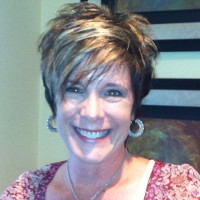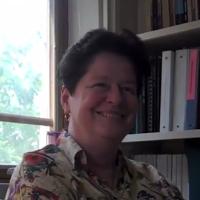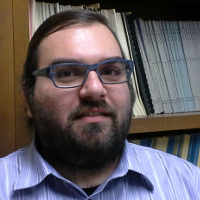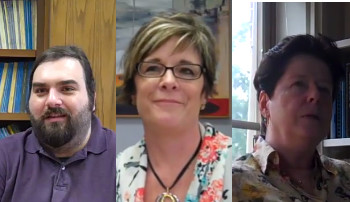Nicky Adams, Margaret M. Strain, and Patrick Thomas
Introduction
Settling on a title for a digital essay that captures the individual experiences of faculty from the same department should be fairly simple. But the more linguistic wrangling we—Nicky Adams, Margaret Strain, and Patrick Thomas—attempted, the more elusive it became. We owe Tolkien a nod then in providing a metaphor that enables us to frame our distinctive motives for attending DMAC in 2008, 2011, and 2013 (respectively) while acknowledging a shared institutional context and means to articulate how these experiences have since informed our professional lives. “There and Back Again” also echoes our process for creating this multimodal essay. That is, we met initially to decide on the arc of our interview questions, videotaped the interviews, and then reviewed the material to formulate our personal reflections and to discuss what we noticed about one another’s narratives.
The essay’s organization reflects this back-and-forth movement. “Starting Out” highlights our initial expectations for attending the institute and briefly describes our institutional profiles. While “In the Middle” could have explored any number of critical moments at DMAC, we chose to focus on the significance of intervention moments when our interaction with DMAC staff and facilitators led to meaningful changes in the way we deploy multimodal technologies and the arguments we make about them. “And Back Again” offers a reflexive glance at our DMAC experiences and an opportunity to consider how the Institute has affected our pedagogical, intellectual, and administrative stances. The order in which we present our video narratives is guided by thematic rather than chronological sequence. In the end, our conclusion serves as a momentary pause in an ongoing effort to bring multimodal composing more fully into our academic lives.
Starting Out…
We do not come to DMAC as blank slates. Rather, our inroads into professional development through DMAC are rooted in larger trajectories of our academic work lives. Considering our motivations for attending DMAC and what we each bring to the program, our narratives of DMAC experiences begin with an examination of our reasons for pursuing professional development in the first place. Given that we each attended DMAC in different years and at different points in our professional careers, it is not surprising that our individual motivations for seeking professional development in digital composition varied significantly. What each of our stories has in common is that our interest in attending DMAC stemmed from our own perceived “lacking.” Each of us had a felt sense that in order to advance in some aspect of our professional work, we needed to pay attention to multimodal composition and digital media. Consequently, as the following interview excerpts indicate, our motivations for attending DMAC in many ways parallel the positions we occupy in our department.
[ezcol_1half]
download a transcript of this video
[/ezcol_1half]
[ezcol_1half_end]Margaret M. Strain, a senior colleague in our department, was motivated to attend DMAC because she “realized that [her] ideas for doing things were far exceeding [her] ability to make them happen.” Already a tenured professor, Margaret’s scholarly interests in a book project augmented by digital media extended beyond her current production skill set, and she attended DMAC as a way to incorporate digital production skills into her scholarly activity.[/ezcol_1half_end]
[ezcol_1half]
download a transcript of this video
[/ezcol_1half]
[ezcol_1half_end]
Both Nicky Adams and Patrick Thomas attended DMAC after their first year in the department. As Nicky reports, she had heard about CIWIC from colleagues prior to her arrival at the University of Dayton, and she finally attended DMAC at the strong suggestion of her WPA. Given that her primary responsibility was teaching professional communication courses, she found it necessary to update her skills and knowledge in digital composing to teach students contemporary practices of workplace writing.[/ezcol_1half_end]
[ezcol_1half]
download a transcript of this video
[/ezcol_1half]
[ezcol_1half_end]
Patrick, too, was already familiar with CIWIC/DMAC and many of the digital composing practices taught in the program. For him DMAC represented a means of developing rhetorical sensibilities to make arguments for curricular change, particularly for increased use of digital media in first-year composition and in a new writing studies major. As a new tenure-track faculty member, Patrick arrived to his new position from a graduate program in which digital media for teaching writing was already available and teaching multimodal composition was highly valued. Learning how to make the case for the importance of these practices in a new institutional context served as an impetus for Patrick’s professional development through DMAC.[/ezcol_1half_end]
Taken together, these stories about individual motivations for attending DMAC speak to the range of professional development that DMAC offers. They also reflect the particular subjective positions we occupy within our department. Margaret’s focus on technical skill development for scholarly publication, Nicky’s goal to update her teaching practices, and Patrick’s need to develop administrative abilities demonstrates the multiplicity of inroads we take into our professional development experiences, and they underscore how our DMAC experiences are contextualized within larger stories of our labor within our department.
…In the Middle…
Professional growth is difficult in any situation. The difficulties of learning new production skills, coupled with new ways of thinking about composing, within a professional community rich with individual experiences highlight moments in which our individual skills and knowledge are called into question. In recalling our experiences at DMAC, each of our stories are punctuated by moments of frustration—instances that demanded that we think about rhetorical invention in new ways. Across all of our stories, these moments occurred during the development of the DMAC “final project.” The process of working through these moments of frustration signified for each of us critical transformations in both our composing processes and our approaches to writing instruction. Interestingly, as the following excerpts detail, each of these moments also involved intervention from other DMAC participants.
[ezcol_1half]Nicky’s interview demonstrates most clearly how difficulties in composing lead to unexpected moments of growth. In particular, her reference to Scott DeWitt’s reassurance that frustration is part of the process of learning is central to her ability to see past the final form of her project to the significance of work involved in the process. As she states, “[w]hatever my project ends up being is so much more than I would have done had I not attended DMAC.” Understanding the particular affordances of her experience—in this instance, engaging practices that she could not accomplish through any other means—demonstrates how Scott’s intervention and reassurance was instrumental in challenging her to think beyond the final form of her project.
[/ezcol_1half]
[ezcol_1half_end]
download a transcript of this video
[/ezcol_1half_end]
[ezcol_1half]
In Margaret’s experience, the frustration of learning new composing practices formed the basis of her final project: a webtext about the frustrations of multimodal composing. Her experiences learning to think “visually, and compositionally in ways [she] hadn’t before” provided a source of difficulty in her composing process. However, Margaret’s frustration also highlights an important aspect of growth in thinking through multimodal composition: namely, that she was able to integrate her prior knowledge in visual art with her current project goals to develop a method for creating an entirely new composition. Further, she began to appreciate the collaborative nature of the assignments such as the literacy narratives she created for the DALN. Both of the narratives focused on the influence of two former teachers who encouraged her to write. Paired with a partner, Margaret recorded narratives which she “had never told out loud before.” Having a live audience for the stories made them all the more poignant.[/ezcol_1half]
[ezcol_1half_end]
download a transcript of this video
[/ezcol_1half_end]
[ezcol_1half]
For Patrick, immersing himself in a scholarly project for DMAC marked a significant moment in which he was forced to reconsider and refamiliarize himself with web development tools he had used in previous forms. In his case, Patrick’s one-on-one interactions with DMAC instructors Krista Bryson and Katie Deluca provided a way to manage the difficulties of refamiliarizing himself with software. Additional individualized consultations from DMAC instructors Debra Journet and Tony O’Keefe were instrumental in helping Patrick reach his goal of developing appropriate arguments for increased technological resources at his home institution.[/ezcol_1half]
[ezcol_1half_end]
download a transcript of this video
[/ezcol_1half_end]
In all of our stories, working through difficult composing processes with individual DMAC instructors and other participants remained a consistent source of support for engaging in new production practices and new ways of thinking through our DMAC final projects. This community of support among facilitators and learners provided the means for professional growth to take place in each of our experiences.
…And Back Again
Professional development is a sustained, ongoing enterprise. In fact, it may never be “finished” in any real sense. Each of our stories concludes with an acknowledgment that our DMAC experiences and the particular types of skills and knowledge we gained have residual implications for continued work in our department. To have a lasting impact, we must also consider how our professional development experiences can be “taken away” from their original sites and reintegrated into our larger scope of professional practices. Here, we discuss the ways in which our DMAC experiences have informed more immediately our professional work and, perhaps more importantly, our professional identities within our department.
[ezcol_1half]
download a transcript of this video
[/ezcol_1half]
[ezcol_1half_end]Earlier in his interview, Patrick stated that one of his reasons for attending DMAC was to develop rhetorical sensibilities in order to make persuasive arguments to his colleagues and administrators for increased technological resources in the department and for curricular changes to include new media composition. In his post-DMAC reflection, Patrick notes the importance of a DMAC experience for all English faculty when he says, “[w]e all work with texts…being able to think about textual analysis through the process of production is very important to [all] English studies scholarship.” This excerpt indicates how Patrick’s DMAC experience has allowed him to be better positioned to make arguments for curricular change (and the resources this change requires). Patrick notes, too, that his confidence in teaching multimodal composition was reinforced by his DMAC experience. Together, these reflections demonstrate the administrative and pedagogical influence of DMAC for Patrick.
[/ezcol_1half_end]
[ezcol_1half]
download a transcript of this video
[/ezcol_1half]
[ezcol_1half_end]
Margaret’s experience further indicates how professional growth through DMAC is connected to one’s own position within her home department. She developed a stronger identity as an advocate for digital resources and innovative curricula while also drawing attention to the rhetorical and pragmatic issues surrounding the labor of teaching and learning in multimodal composition. In this way, Margaret’s DMAC experience provides her with a means of advocacy-–-of seeing what is possible given current departmental and institutional resources—–that Patrick and Nicky, in their respective positions, cannot embody. Instead, Margaret is able to connect her years of experience, her status as a tenured professor, and her intimate knowledge of institutional culture to the pedagogical innovations she saw possible through her DMAC experience. In her DMAC project she investigated the rhetorical and pragmatic issues of multimodal composition as a learner and teacher. The intersection of these two types of experiential knowledge provides the means by which her advocacy for digital resources and multimodal composition at our institution can take on new meaning.[/ezcol_1half_end]
[ezcol_1half]
download a transcript of this video
[/ezcol_1half]
[ezcol_1half_end]
Nicky’s reflection demonstrates how the residual effects of DMAC continue to impact her professional identity. Most importantly, as an instructor and director of the department’s writing internship program, her DMAC experience helped her reconsider her identity as a conduit or “connector”—someone who links students and professionals and the larger community through both pedagogical practices and by using digital media to make the work of professional writing visible to students and professionals.[/ezcol_1half_end]
Final Thoughts
The DMAC Institute immerses participants from diverse home institutions in a technology-rich environment. This immersion, even for participants whose home institutions lack technological resources, affords participants the opportunity to build on their own rhetorical abilities through guided instruction in digital modes. In so doing, the institute invites participants to imagine what is possible within their home institutions, to consider the importance of digital composition, and to learn about digital composing through the process of composing itself.
While the direct instruction at DMAC focuses on digital composing, our narratives indicate that the breadth of professional development DMAC offers extends far beyond technical aspects. Or, perhaps, it is through immersion in digital composing practices that participants gain greater agency. These broader experiences of professional development wend their way into participants’ pedagogical, administrative, and scholarly work. Our own narratives and reflections indicate that not only has the institute shaped our teaching practices, but we have integrated our DMAC experiences into our professional lives in different, and equally important ways—starting out anew, yet again.
Authors
 Nicky Adams is a full-time lecturer in English at the University of Dayton, where she teaches professional communication and coordinates the Writing Internship Program. She previously directed the writing center and taught at Wright State University, and later worked as an account manager in the Workforce Development Division of Sinclair Community College. Through her LLC, Workplace Communication Consulting, Nicky conducts professional communication training for academic and corporate clients in the Dayton area.
Nicky Adams is a full-time lecturer in English at the University of Dayton, where she teaches professional communication and coordinates the Writing Internship Program. She previously directed the writing center and taught at Wright State University, and later worked as an account manager in the Workforce Development Division of Sinclair Community College. Through her LLC, Workplace Communication Consulting, Nicky conducts professional communication training for academic and corporate clients in the Dayton area.
 Margaret M. Strain is a professor of English at the University of Dayton where she teaches undergraduate and graduate courses in writing, composition theory, histories of rhetoric, and Irish drama. She has edited Principles and Practices: Discourses for the Vertical Curriculum, and with Alexis Hart she edits the interviews section of Kairos. Her work on the disciplinary rise of composition studies, research methods, oral narratives, and graduate writing instruction has appeared in Rhetoric Society Quarterly, JAC, Writing on the Edge, Composition Forum, Pedagogy, and edited collections.
Margaret M. Strain is a professor of English at the University of Dayton where she teaches undergraduate and graduate courses in writing, composition theory, histories of rhetoric, and Irish drama. She has edited Principles and Practices: Discourses for the Vertical Curriculum, and with Alexis Hart she edits the interviews section of Kairos. Her work on the disciplinary rise of composition studies, research methods, oral narratives, and graduate writing instruction has appeared in Rhetoric Society Quarterly, JAC, Writing on the Edge, Composition Forum, Pedagogy, and edited collections.

Patrick W. Thomas is an assistant professor of English at the University of Dayton, where he teaches courses in literacy, professional writing, and composition.
